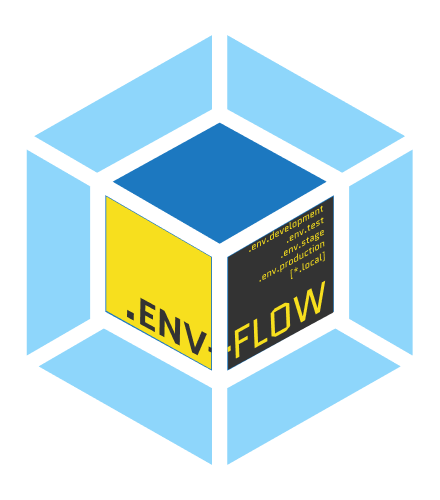dotenv-flow-webpack
A Webpack plugin that allows you to securely use environment variables within your javascript web application, loading them using dotenv-flow's .env* files loading strategy.
dotenv-flow extends dotenv, adding support of
NODE_ENV-specific.env*files like.env.development,.env.test,.env.stage, and.env.production, and the appropriate.env*.localoverrides allowing your app to have multiple environments with selectively-adjusted environment variable setups and load them dynamically depending on the current NODE_ENV.
🌱 Inspired by dotenv-webpack, CreateReactApp's storing configs in .env* files approach,
the Twelve-Factor App methodology in general, and its store config in the environment section in particular.
Key Features
-
Environment-based configuration: You can have different
.env*files for various environments like development, test, and production. -
Variable overriding (or environment-specific cascade): Allows you to selectively override the default and environment-specific variables with the appropriate
.env*.localoverrides. -
Secure: Injects variables by replacing the
process.env.<YOUR_VAR>entries with the actual values from your.env*files during the build process, thus exposing only those variables that are explicitly used in your code. - dotenv-flow as a Webpack plugin: directly integrates dotenv-flow with all its flexibility options to your build process making it easier to use environment variables without extra build scripts.
Installation
Using NPM:
$ npm install dotenv-flow-webpack --save-devUsing Yarn:
$ yarn add dotenv-flow-webpack --devBasic usage
Here's how to include the dotenv-flow-webpack to your webpack.config.js:
// webpack.config.js
const DotenvFlow = require('dotenv-flow-webpack');
module.exports = {
// ...other webpack configurations
plugins: [
new DotenvFlow({
// configuration options
})
],
// ...other webpack plugins
};Configuration options
node_env
Type: string
Default: process.env.NODE_ENV || options.default_node_env
By default, the plugin refers the NODE_ENV environment variable to detect the environment to use.
With the node_env option you can force the module to use your custom environment value independent of process.env.NODE_ENV.
new DotenvFlow({
node_env: 'production'
})default_node_env
Type: string
Default: undefined
If the NODE_ENV environment variable is not set, the module doesn't load/parse any NODE_ENV-specific files at all.
Therefore, you may want to use "development" as the default environment.
new DotenvFlow({
default_node_env: 'development'
})path
Type: string
Default: process.cwd() (current working directory)
With the path initialization option you can specify a path to .env* files directory.
new DotenvFlow({
path: './config'
})If the option is not provided, the current working directory is used.
pattern
Type: string
Default: '.env[.node_env][.local]'
Allows you to change the default .env* files' naming convention
if you want to have a specific file naming structure for maintaining
your environment variables' files.
Default Value
The default value ".env[.node_env][.local]" makes dotenv-flow-webpack
look up and load the following files in order:
.env.env.local.env.${NODE_ENV}.env.${NODE_ENV}.local
For example, when the proess.env.NODE_ENV (or options.node_env) is set to "development",
dotenv-flow-webpack will be looking for and parsing (if found) the following files:
.env.env.local.env.development.env.development.local
Custom Pattern
Here is a couple of examples of customizing the .env* files naming convention:
For example, if you set the pattern to ".env/[local/]env[.node_env]",
dotenv-flow-webpack will look for these files instead:
.env/env.env/local/env.env/env.development.env/local/env.development
… or if you set the pattern to ".env/[.node_env/].env[.node_env][.local]",
the plugin will try to find and parse:
.env/.env.env/.env.local.env/development/.env.development.env/development/.env.development.local
› Please refer to dotenv-flow.listFiles(options) to learn more.
encoding
Type: string
Default: 'utf8'
You can specify the encoding of your files containing environment variables.
new DotenvFlow({
encoding: 'base64'
})system_vars
Type: boolean
Default: false
If true, all the predefined process.env.* variables will also be loaded.
In accordance to the dotenv-flow's specification, all the predefined system environment variables will have higher priority over the .env* files defined.
new DotenvFlow({
system_vars: true
})options.debug
Type: boolean
Default: false
Enables detailed logging to debug why certain variables are not being set as you expect.
new DotenvFlow({
debug: true
})silent
Type: boolean
Default: false
Set to true to suppress all kinds of errors and warnings.
new DotenvFlow({
silent: true
})Project Example
Let's suppose you have the following files in your project:
# .env
DATABASE_HOST=127.0.0.1
DATABASE_PORT=27017
DATABASE_USER=default
DATABASE_PASS=
DATABASE_NAME=my_app
SERVICE_URL=/api/v1# .env.development
DATABASE_NAME=my_app_dev
SERVICE_URL=http://localhost:3000/api/v1# .env.test
SERVICE_URL=https://localhost:3001/api/v1# .env.production
DATABASE_HOST=10.0.0.32
DATABASE_PORT=27017
DATABASE_USER=devops
DATABASE_PASS=1qa2ws3ed4rf5tg6yh
DATABASE_NAME=application_storage
SERVICE_URL=https://myapp.com/api/v1// file1.js
if (process.env.NODE_ENV !== 'production') {
console.log(`Running in the "${process.env.NODE_ENV}" mode.`);
}
else {
console.log('We are in production!');
}
const USERS_ENDPOINT = process.env.SERVICE_URL + '/users';
console.log('USERS_ENDPOINT:', USERS_ENDPOINT);Thus, when you build your app with NODE_ENV=development, the resulting bundle will include something like this:
// file1.js
if (true) {
console.log("Running in the ".concat("development", " mode."));
} else {}
const USERS_ENDPOINT = "http://localhost:3000/api/v1" + '/users';
console.log('USERS_ENDPOINT:', USERS_ENDPOINT);Or if you build your app with NODE_ENV=production, then the output will look like:
// file1.js
if (false) {} else {
console.log('We are in production!');
}
const USERS_ENDPOINT = "https://myapp.com/api/v1" + '/users';
console.log('USERS_ENDPOINT:', USERS_ENDPOINT);And after all the optimization procedures it will be compressed till:
console.log("We are in production!");
console.log("USERS_ENDPOINT:", "https://myapp.com/api/v1/users");Make a note that values of DATABASE_(HOST/PORT/USER/PASSWORD/NAME) will not be present in the resulting bundle while they are not referenced anywhere in the code.
Additional information
Please refer the dotenv-flow documentation to learn more about the .env* files concept.
Here is the list of related sections:
Contributing
Feel free to dive in! Open an issue or submit PRs.
Running tests
Using NPM:
$ npm testUsing Yarn:
$ yarn testLicense
Licensed under MIT © 2019-2023 Dan Kerimdzhanov
